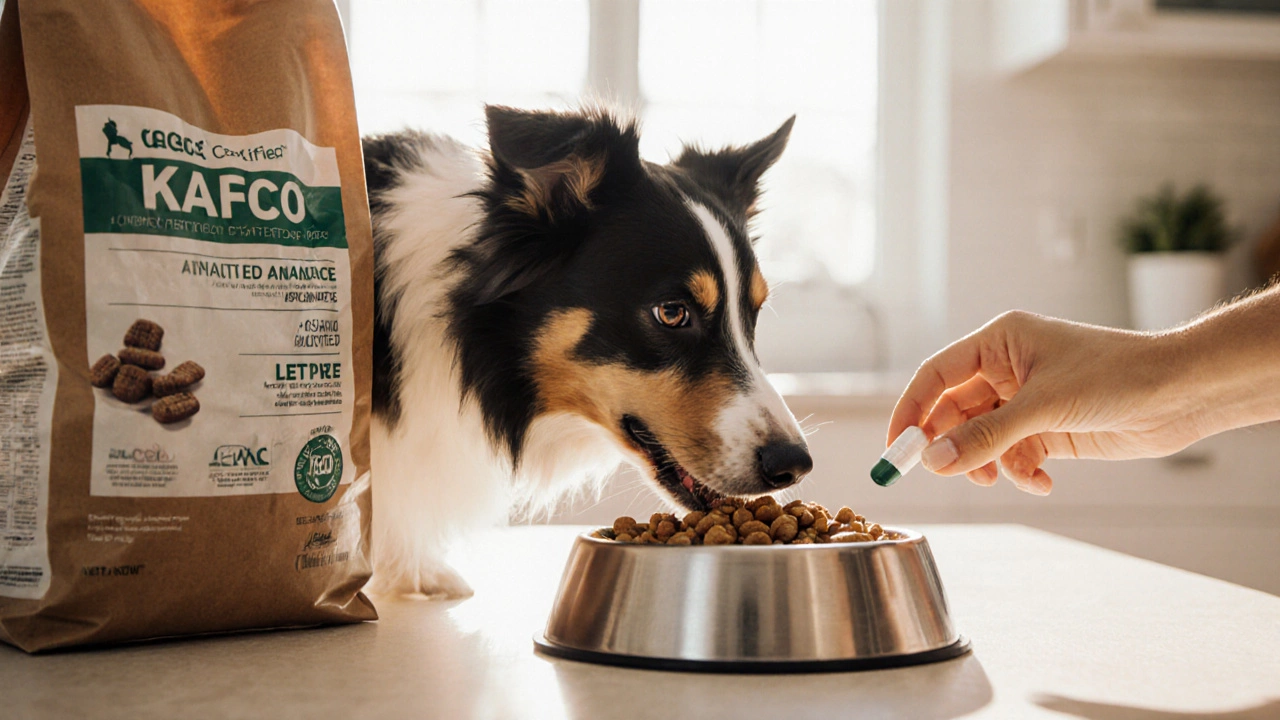Dog Supplements: What Every Owner Should Know
If you’ve ever wondered whether a vitamin or joint aid could make a real difference for your dog, you’re not alone. Supplements are just extra nutrients that fill gaps in a regular diet. They can help with shaky joints, dull coats, or a slow immune system. The key is to treat them like tools – useful when needed, but not a magic fix.
Why Use Supplements?
Most commercial dog foods are balanced, but life isn’t always perfect. Older pups may need extra glucosamine for joint comfort, while a picky eater could miss out on essential omega‑3s for a shiny coat. Supplements also support specific health concerns, such as probiotics for gut health or antioxidants for heart support. Giving the right product can improve energy levels, reduce stiffness, and keep your dog feeling happy.
Picking the Right One
Start by checking the label. Look for a clear list of active ingredients, the amount per serving, and a statement from a veterinarian or pet nutritionist. Avoid products that hide fillers like wheat or soy unless your dog can tolerate them. Quality makers use third‑party testing to prove purity – see if they mention a lab code or certification.
Ask your vet before adding anything new, especially if your dog is on medication. Some supplements, like high‑dose fish oil, can interact with blood thinners. A quick vet chat helps you choose the right dosage and avoids unnecessary risks.
When you shop, compare forms. Chewable tablets are easy to hide in treats, while soft gels work well for oily products like salmon oil. Powders can be sprinkled onto food but may taste strong. Pick the format that fits your routine – consistency matters more than the exact product.
Keep an eye on results. Most supplements need a few weeks to show effects. If you notice improved mobility, a shinier coat, or steadier stools, you’re on the right track. If nothing changes after a month, try a different brand or talk to your vet about alternative options.
Finally, store supplements properly. Heat, light, and moisture can degrade vitamins. Keep bottles sealed in a cool, dry place and check expiration dates regularly. By following these simple steps, you’ll make sure your dog gets the boost it needs without wasted money or unnecessary risks.
Top Dog Supplements for Health & Longevity in 2026
Discover top dog supplements for joint health, skin, and digestion. Learn what works, when to use them, and how to choose safely with expert advice.
What Are the Side Effects of Cod Liver Oil for Dogs?
Cod liver oil for dogs can improve coat and joint health, but too much causes dangerous vitamin A and D toxicity. Learn the real side effects, safe dosages, and better alternatives.
Should I Give My Dog Fish Oil? The Real Benefits and Risks Explained
Fish oil can help dogs with itchy skin, joint pain, and heart health - but only if given in the right dose. Learn how much to give, what to avoid, and how to choose a safe product.
Do Dogs Really Need Supplements? The Truth Behind the Hype
Most healthy dogs don't need supplements if they eat balanced commercial food. Learn when supplements actually help-and which ones can be dangerous-for your dog's long-term health.
Olive Oil vs Fish Oil for Dogs: Which Is Better?
Find out whether olive oil or fish oil is best for your dog's skin, coat, joints, and overall health, with dosage tips, safety warnings, and expert FAQs.
Should I Add Supplements to My Dog's Food? Facts, Risks, and Smart Tips
Unpack the real deal on dog supplements—when your dog needs them, what to watch for, and how to be sure you’re not doing more harm than good. Clear, practical advice.
Can Dogs Eat Bananas? What to Know Before You Share
Wondering if dogs can eat bananas? This article breaks down whether bananas are safe for dogs, the benefits and downsides, and how to feed them the right way. We’ll get real about portion sizes and digestion tips, plus when bananas fit (or don’t) in your dog’s diet. You’ll even learn how they compare to dog supplements. Perfect for dog lovers who want the facts before sharing a snack.
Healthiest Vegetables for Dogs: A Practical Guide
Wondering which veggies actually help your dog's health? This article digs into which vegetables are safe, nutritious, and worth adding to your dog's diet. You'll learn practical tips, discover what to avoid, and get real examples of how to prepare veggies your pup will love. We also clear up myths about feeding dogs vegetables. Boost your dog's well-being with the right greens—plain, simple, and backed by real info.
Fish Oil vs. Salmon Oil: What's Best for Your Dog?
Wondering whether fish oil or salmon oil is the right pick for your pup? Both oils bring essential Omega-3 fatty acids to the table but differ in their specific benefits. Fish oil comes from a variety of fish, making it versatile and often more affordable, while salmon oil is pure and often preferred for its rich nutrient profile. We dive into what sets them apart and how to choose the best option for your furry friend.
Can I Give My Dog Cod Liver Oil Every Day?
Cod liver oil can offer a range of health benefits for dogs, thanks to its Omega-3 fatty acids and vitamins. However, over-supplementing can lead to potential health issues. This article examines the benefits, ideal dosage, and possible risks to help dog owners decide if daily supplementation is suitable for their furry friend. Learn how to safely incorporate cod liver oil into your dog's diet and what changes to watch for.
Is Greek Yogurt Dog-Friendly?
Greek yogurt can be a great addition to your dog's diet, offering benefits like probiotics and essential nutrients. However, not all Greek yogurt is created equal when it comes to canine consumption. This article explores nutritional benefits, potential risks, and practical tips for incorporating it safely. Learn how to select the right type and serving sizes to keep your furry friend healthy and happy. Discover the surprising ways Greek yogurt might just be the tasty treat your dog needs.
Are Dog Supplements Necessary for Your Pet's Wellbeing?
Dog supplements have become increasingly popular, but are they really needed for your furry friend? This article delves into the world of supplements for dogs, exploring when they might be appropriate and what to consider before adding them to your pet’s diet. Understanding the needs of different breeds and life stages is vital, and we'll also discuss some surprising natural alternatives. Our aim is to provide a clear perspective to keep your canine companion healthy and happy.
















